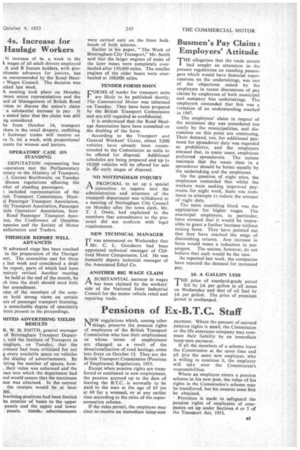Busmen's Pay Claim : Employers' Attitude
Page 35

If you've noticed an error in this article please click here to report it so we can fix it.
THE allegation that the trade unions had sought an alteration in the present regulations on standing passengers which would have financial repercussions on the undertakings, was one of the 'objections raised by the employers in recent discussions of pay claims by employees of both municipal and company bus undertakings. The employers contended that this was a violation of an understanding reached in 1947.
The employees' claim in respect of the minimum day was considered too costly by the municipalities, and discussions on this point are continuing. Their demand, too, for additional payment for spreadover duty was regarded as prohibitive, and the employers stressed that, in many cases, employees preferred spreadovers. The unions maintain that the waste time in a spreadover should be borne equally by the undertaking and the employees.
On the question of night rates, the employers contended that whilst the workers were seeking improved payments for night work, there was resistance to attempts to reduce the amount of night duty.
The main stumbling block was the application for higher wages. The municipal employers, in particular, have stressed that it would be impossible to grant a further increase without raising fares. They have pointed out that they have reached the stage of diminishing returns. Any increase in fares would mean a reduction in passengers. The unions, however, do not believe that such would be the case.
As reported last week, the comPanies have rejected the demand for increased pay.
id. A GALLON LESS




























































































